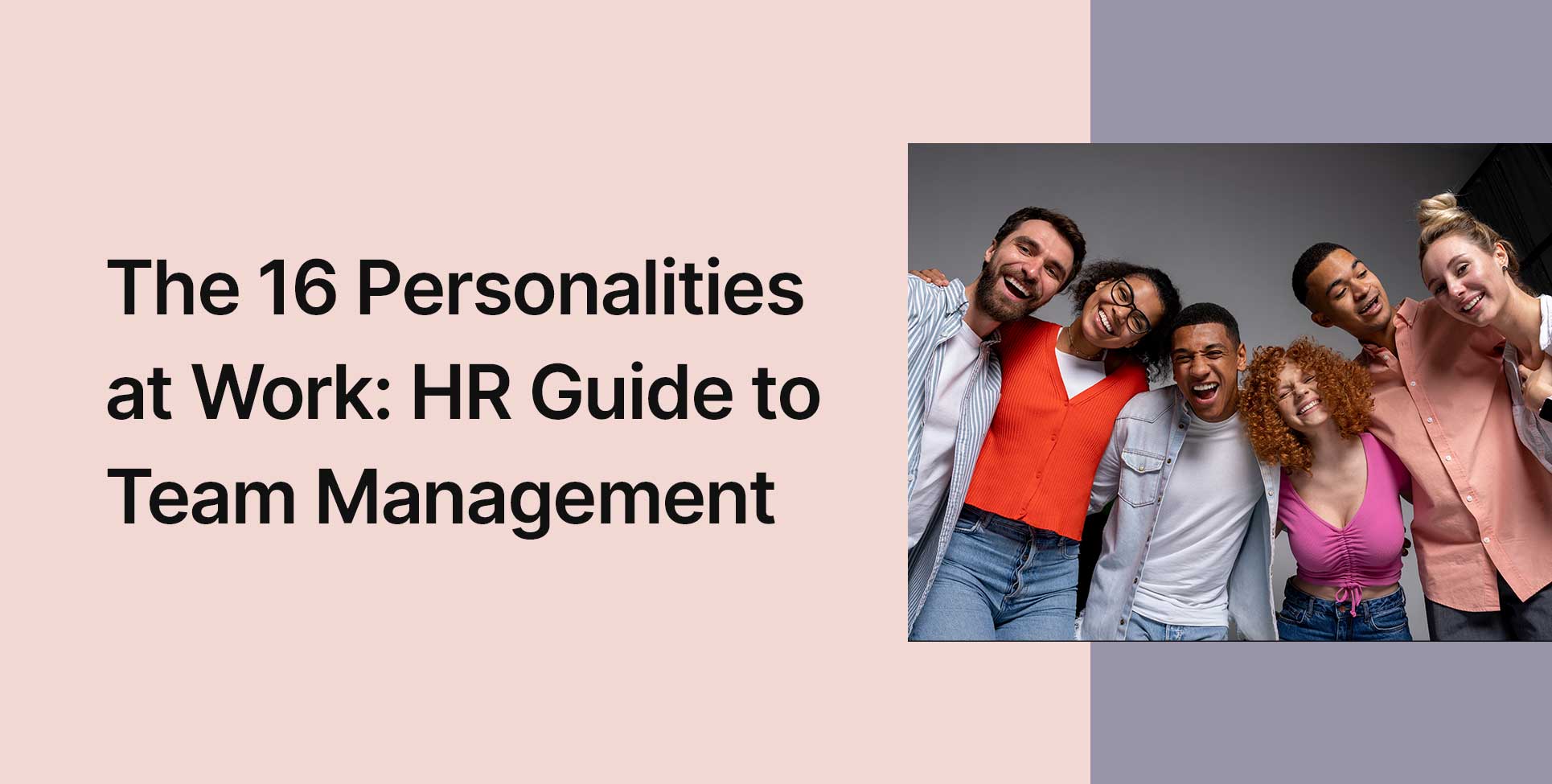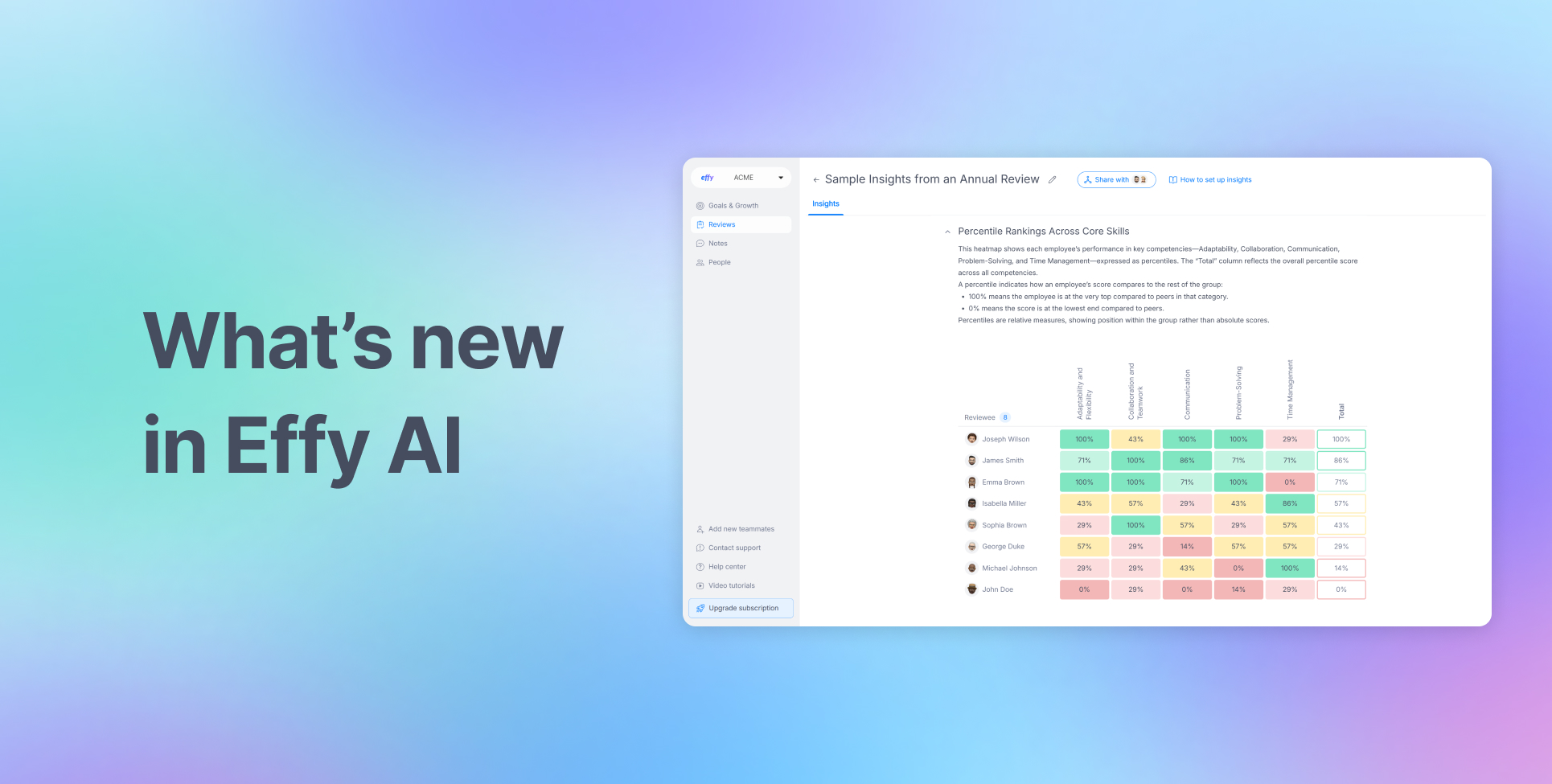Understanding your team's natural work styles and personality traits is crucial for creating productive, harmonious workplaces. The 16 personalities test helps managers identify individual strengths and weaknesses for better social interaction.
Effective leadership requires recognizing that each employee brings unique perspectives and personality preferences to their work. By understanding these differences, managers can create environments where every team member thrives and contributes meaningfully.
What are the 16 personalities?
The 16 personalities traits identify distinct behavioral patterns based on how people process information, make decisions, and interact with the world. Knowing these basic differences helps managers create more effective teams, improve communication, and boost overall workplace productivity by leveraging each person's natural personality type.
Let's take a look at the personality assessment breakdown:
NT (Analysts) are strategic thinkers who focus on competence and new ideas. They excel at analyzing complex problems, developing long-term strategies, and challenging existing systems in the present moment. This MBTI personality type thrives in environments that reward intellectual achievement and technical expertise.
NF (Diplomats) are people-focused visionaries who prioritize harmony and self awareness. They excel at understanding others' motivations, facilitating collaboration, and inspiring teams toward shared goals. These personalities bring empathy, creativity, and strong self reflection skills to workplace dynamics.
SJ (Sentinels) are natural born leaders who value stability and proven methods. They excel at maintaining systems, following procedures, and ensuring consistent quality. These personality types provide structure, dependability, and attention to detail that keeps organizations running smoothly, often thriving in well-defined organizational structure environments where roles and responsibilities are clearly established.
SP (Explorers) are adaptable problem-solvers who prefer flexibility and hands-on approaches. They excel at responding to immediate challenges, logical thinking, finding practical solutions, and working effectively under pressure. These personalities bring energy, resourcefulness, and real-world problem-solving skills to teams
The 16 personalities in the workplace
Each personality type brings unique strengths and weaknesses to the workplace. Understanding this free personality test helps managers assign appropriate roles, communicate effectively, and create environments where every team member can thrive and contribute their best work.
INTJ - The Architect
Strategic visionaries who excel at developing long-term plans and innovative solutions. They prefer working independently on complex projects and value competence above all else in professional settings.
- Natural work style: Independent, systematic approach to complex problems with focus on long-term strategic thinking
- Communication preferences: Direct, concise exchanges with emphasis on facts and logical reasoning rather than small talk
- Ideal work environment: Quiet, autonomous workspace with minimal interruptions and freedom to implement abstract ideas
INTP - The Thinker
Analytical problem-solvers who thrive on exploring theoretical concepts and finding creative solutions. They prefer flexible schedules and intellectual challenges over routine tasks or rigid structures.
- Natural work style: Flexible, research-oriented approach with deep focus on understanding underlying principles and theories
- Communication preferences: Thoughtful discussions about ideas and concepts, preferring written communication over meetings when possible
- Ideal work environment: Flexible schedule with intellectual freedom, minimal bureaucracy, and opportunities for independent research
ENTJ - The Commander
Natural leaders who excel at organizing people and resources to achieve ambitious goals. Their individual preferences thrive in competitive environments and prefer taking charge of projects and strategic initiatives.
- Natural work style: Goal-oriented leadership with systematic planning and efficient execution of complex organizational initiatives
- Communication preferences: Clear, direct communication with focus on results and strategic objectives rather than personal feelings
- Ideal work environment: Leadership roles with authority to make decisions, competitive atmosphere, and opportunities for advancement
ENTP - The Debater
Innovative brainstormers who excel at generating ideas and exploring possibilities. They value efficiency and intellectual stimulation over routine tasks and traditional approaches to problem-solving.
- Natural work style: Creative, adaptable approach with focus on generating multiple solutions and exploring new possibilities
- Communication preferences: Engaging debates and brainstorming sessions, preferring dynamic discussions over formal presentations or documentation
- Ideal work environment: Collaborative, stimulating atmosphere with variety, minimal routine, and opportunities to develop decision-making skills
INFJ - The Advocate
Insightful counselors who excel at understanding others and creating meaningful change. INFJ personalities prefer purposeful work that aligns with personal growth and allows them to help others grow.
- Natural work style: Thoughtful, purpose-driven approach with focus on long-term impact and meaningful contribution to organizational goals
- Communication preferences: One-on-one conversations and small group discussions, preferring depth over breadth in professional relationships
- Ideal work environment: Quiet, harmonious workspace with opportunities for meaningful work and positive impact on others
INFP - The Mediator
Creative idealists who excel at finding authentic solutions and supporting others. They prefer flexible work arrangements and projects that align with their personal values and passions.
- Natural work style: Flexible, values-driven approach with focus on authenticity and emotional support in professional projects
- Communication preferences: Supportive, empathetic exchanges with emphasis on understanding different perspectives and finding common ground
- Ideal work environment: Flexible schedule with creative freedom, supportive colleagues, and work that aligns with personal values
ENFJ - The Protagonist
Charismatic mentors who excel at inspiring and developing others. ENFJ personality types prefer collaborative environments where they can help team members reach their potential and achieve collective goals, often benefiting from structured approaches like a professional development plan template to guide their mentoring efforts.
- Natural work style: People-focused leadership with emphasis on team development, collaboration, and creating positive workplace culture
- Communication preferences: Warm, encouraging interactions with focus on building relationships and understanding others' needs and motivations
- Ideal work environment: Collaborative atmosphere with opportunities to mentor others, positive team dynamics, and meaningful organizational mission
ENFP - The Campaigner
Enthusiastic innovators who excel at inspiring others and exploring new possibilities. These human personalities prefer dynamic environments with variety and opportunities to connect with people and pursue creative projects.
- Natural work style: Energetic, people-centered approach with focus on innovation, collaboration, and exploring multiple creative possibilities
- Communication preferences: Enthusiastic, expressive interactions with emphasis on brainstorming and building connections with colleagues
- Ideal work environment: Dynamic, social atmosphere with variety, creative challenges, and opportunities for collaboration and innovation
ISTJ - The Logistician
Reliable organizers who excel at maintaining psychological functions and ensuring quality. They prefer structured environments with clear procedures and consistent routines that support organizational stability.
- Natural work style: Systematic, detail-oriented approach with focus on accuracy, consistency, and following established procedures and protocols
- Communication preferences: Clear, factual exchanges with emphasis on specific details and practical information rather than abstract concepts
- Ideal work environment: Structured, stable workspace with clear expectations, established procedures, and minimal unexpected changes
ISFJ - The Protector
Supportive caregivers who excel at helping others and maintaining harmony. Their introverted intuition calls for stable environments where they can provide practical support and ensure everyone's needs are met.
- Natural work style: Service-oriented, supportive approach with focus on helping others and maintaining harmonious workplace relationships
- Communication preferences: Gentle, considerate interactions with emphasis on understanding others' needs and providing practical support
- Ideal work environment: Harmonious, stable workspace with opportunities to help others and clear appreciation for contributions
ESTJ - The Executive
Efficient organizers with a strong sense for managing people and processes. They prefer action-oriented environments with clear hierarchies and established procedures that support organizational effectiveness.
- Natural work style: Results-oriented leadership with focus on efficiency, organization, and systematic execution of established procedures
- Communication preferences: Direct, business-focused interactions with emphasis on practical results and clear expectations for performance
- Ideal work environment: Structured organization with clear authority, established procedures, and opportunities for tough decisions and decision-making
ESFJ - The Consul
ESFJ personalities are caring coordinators who excel at supporting others and maintaining team harmony. They prefer collaborative environments and practical applications where they can help colleagues and contribute to positive workplace culture.
- Natural work style: People-focused, collaborative approach with emphasis on supporting others and maintaining positive team dynamics
- Communication preferences: Warm, personal interactions with focus on building relationships and understanding others' feelings and needs
- Ideal work environment: Collaborative, supportive atmosphere with opportunities to help others and clear appreciation for contributions
ISTP - The Virtuoso
Practical problem-solvers and hands-on learners who excel at work and troubleshooting. They prefer flexible environments where they can work independently and apply their self-reliant nature to real-world challenges.
- Natural work style: Independent, practical approach with focus on hands-on problem-solving and efficient use of tools and resources
- Communication preferences: Concise, task-focused interactions with emphasis on practical information and minimal unnecessary meetings or discussions
- Ideal work environment: Flexible, autonomous workspace with hands-on challenges, minimal bureaucracy, and freedom to work independently
ISFP - The Adventurer
Gentle creators who excel at artistic work and supporting others. They prefer flexible environments where they can express creativity and work at their own pace on meaningful projects.
- Natural work style: Flexible, creative approach with focus on personal expression and working at own pace on meaningful projects
- Communication preferences: Gentle, supportive interactions with emphasis on understanding and respecting individual differences and perspectives
- Ideal work environment: Flexible, peaceful workspace with creative freedom, supportive colleagues, and opportunities for artistic expression
ESTP - The Entrepreneur
Dynamic performers who excel at adapting to changing situations and working with people. They prefer fast-paced environments with variety and opportunities for immediate action and results.
- Natural work style: Energetic, adaptable approach with focus on immediate action, practical solutions, and working directly with people
- Communication preferences: Engaging, spontaneous interactions with emphasis on real-time problem-solving and building rapport with colleagues
- Ideal work environment: Dynamic, fast-paced atmosphere with variety, immediate challenges, and opportunities for social interaction
ESFP - The Entertainer
Enthusiastic performers who excel at energizing others and developing interpersonal skills. They prefer collaborative environments with variety and opportunities to connect with people and make work enjoyable.
- Natural work style: Energetic, people-centered approach with focus on collaboration, positive energy, and abstract thinking
- Communication preferences: Warm, expressive interactions with emphasis on building relationships and creating positive, engaging workplace experiences
- Ideal work environment: Social, dynamic atmosphere with variety, collaborative projects, and opportunities to interact with and energize others
Building teams with 16 personalities diversity
Teams with diverse personality types outperform homogeneous ones by combining different thinking styles, problem-solving approaches, and communication methods to create more innovative and effective solutions.
Which means applying your knowledge from the Myers-Briggs Type Indicator or any other popular personality assessments can become a powerful tool in your arsenal.
Enhanced problem-solving capabilities
Teams with diverse 16 personalities approach challenges from multiple angles, combining analytical thinking with creative insights and practical implementation. This variety ensures comprehensive solutions that address both immediate needs and long-term implications effectively.
Improved communication and collaboration
Different personality traits naturally complement each other's communication styles, creating balanced team dynamics. Introverts provide thoughtful analysis while extroverts facilitate discussion, and detail-oriented members balance big-picture thinkers for comprehensive project execution.
Using tailored 360 feedback questions that account for these individual preferences helps teams understand each member's unique contributions and communication preferences.
Increased innovation and adaptability
Personality test diversity fosters creative tension that drives innovation, as different types challenge assumptions and propose alternative approaches. This variety helps teams adapt quickly to changing circumstances and find creative solutions to complex problems
Conclusion
Understanding the 16 personalities in your workplace transforms how you manage teams and assign responsibilities. This knowledge enables better communication, reduces conflicts, and helps create environments where every personality type can contribute effectively.
Implementing personality type-aware management practices leads to improved employee satisfaction, better team performance, and stronger organizational culture. Consider combining this approach with tools like the 9 box talent review to assess both performance and potential across different personality types, creating a comprehensive talent management strategy.


